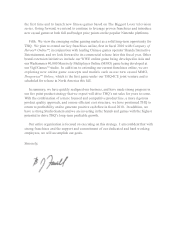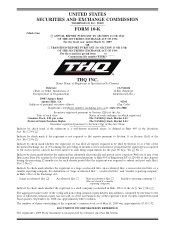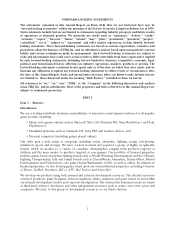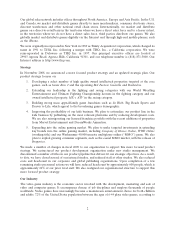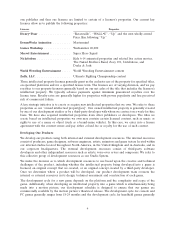THQ 2009 Annual Report Download - page 14
Download and view the complete annual report
Please find page 14 of the 2009 THQ annual report below. You can navigate through the pages in the report by either clicking on the pages listed below, or by using the keyword search tool below to find specific information within the annual report.Upon termination of a platform license for any reason other than our breach or default, we have a limited
period of time to sell any existing product inventory remaining as of the date of termination. The length of
this sell-off period varies between 90 and 180 days, depending upon the platform agreement. We must
destroy any such inventory remaining after the end of the sell-off period. Upon termination as a result of
our breach or default, we must destroy any remaining inventory within a minimum number of days as
specified by the manufacturer.
Seasonality
The interactive entertainment software market is highly seasonal, with sales typically significantly higher
during the third quarter of our fiscal year, due primarily to the increased demand for interactive games
during the year-end holiday buying season.
Major Customers
Our largest customers worldwide include Best Buy, GameStop, Target, Toys ‘‘R’’ Us, Metro Group, and
Wal-Mart. We also sell our products to other national and regional retailers, discount store chains and
specialty retailers. Wal-Mart and GameStop each accounted for more than 10% of our gross sales in fiscal
2009, 2008 and 2007. We sell our products to Wal-Mart pursuant to individual purchase orders placed by
Wal-Mart and sell our products to GameStop pursuant to individual purchase orders placed by GameStop.
We have two ‘‘Vendor’’ agreements with Wal-Mart (one for our console products and one for our PC
products) that we entered into in 2001 and 2002, respectively, that address certain standard terms and
conditions between us and Wal-Mart, such as payment terms; however, the agreements do not contain any
commitment for Wal-Mart to purchase, or for us to sell, any minimum level of products. We do not have
any agreements with GameStop. With respect to both Wal-Mart and GameStop, as well as our other
customers, the customer submits a purchase order for each purchase request, and that purchase order
contains basic pricing and delivery terms for such purchase. None of the purchase orders individually, with
any customer, accounted for more than 10% of the Company’s consolidated net revenue for the fiscal years
ended March 31, 2009, 2008 or 2007. A substantial reduction, termination of purchases, or business failure
by any of our largest customers could have a material adverse effect on us.
Competition
As a publisher of interactive entertainment software, we consider ourselves to be part of the entertainment
industry. At the most fundamental level, our products compete with other forms of entertainment, such as
motion pictures, television and music, for the leisure time and discretionary spending of consumers. Our
primary competition for sales of video games comes from Sony, Microsoft and Nintendo, each of which is a
large developer and marketer of software for its own platforms, as well as other publishers and developers
of interactive entertainment software, such as Activision/Blizzard, Atari, Electronic Arts, LucasArts,
Namco, Sega, Take-Two Interactive Software, and Ubisoft. Additionally, in recent years, certain large
intellectual property owners, such as Disney and Viacom, have established video game units to develop and
publish games based upon certain of the properties they own.
In addition to competing for video game revenue, we compete with our competitors over licenses and
brand-name recognition, access to distribution channels, and effectiveness of marketing and price. We also
face intense competition from our competitors for the services of talented video game producers, artists,
engineers and other employees.
7



